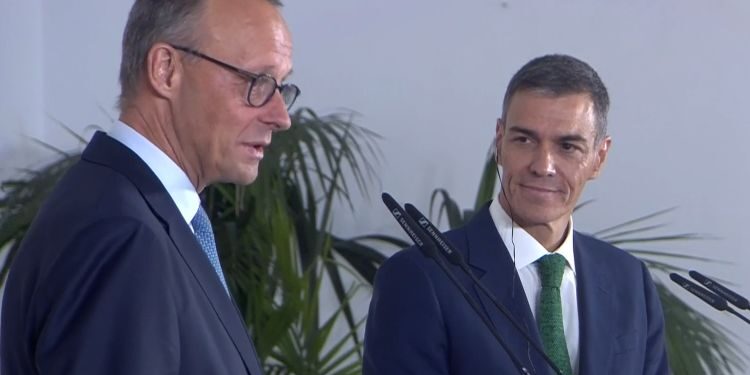Eduardo González
The German government of Friedrich Merz, one of the countries most reluctant to accept the official status of Catalan, Basque, and Galician in the European institutions, has reached an agreement with Spain to “open a dialogue” on this issue “aimed at finding an answer to the Spanish request.”
According to the joint declaration published this Friday, the two governments have agreed to “open a dialogue aimed at finding an answer to the Spanish request that its official languages, other than Spanish, be recognized as official within the European Union in an acceptable way for all EU Member States.”
“Incorporating those languages constitutes an essential part of Spain’s plurilingual national identity. We have therefore jointly decided to undertake bilateral discussions on the basis of which Spain will put forward a text that will be taken again to debate and eventual decision by the 27 EU Member States at a future General Affairs Council meeting,” the statement continues. “This bilateral dialogue will begin as soon as possible between our respective Ministries of Foreign Affairs,” it concludes.
For his part, the Minister of Foreign Affairs, José Manuel Albares, welcomed this “extremely important step towards the final approval of Catalan, Basque, and Galician as official languages of the European Union and for the recognition of Spain’s plural and linguistic identity.”
“Twenty million Spaniards, 40 percent of our population, live in autonomous communities with more than one official language, and this must be protected and acknowledged by the European Union,” the minister declared in a video released by the Foreign Office. “Starting today, we will further intensify dialogue with Germany to swiftly achieve unanimity in the Council,” he added.
According to Albares, “this declaration also demonstrates the Spanish government’s commitment to the official status of Catalan, Basque, and Galician in Europe, thus culminating an unavoidable and irreversible path that has already borne fruit, such as the introduction of Catalan as a language in European schools or the fact that our languages are also official in the Economic and Social Council.”
On September 18, during a joint press conference in Madrid with Prime Minister Pedro Sánchez, Merz stated that he understood Spain’s interest in moving forward with this demand, but simply noted that “Artificial Intelligence (AI)” could facilitate the incorporation of co-official languages into the European Union institutions in the medium term, because it would reduce the need for interpreters and allow for fluid communication between all official EU languages, something that, he warned, would still take some time.
The joint statement comes after Junts issued an ultimatum to the Sánchez government to move forward and announced its intention to consult with members on the future relationship between Carles Puigdemont’s pro-independence party and the PSOE. Germany is one of the EU countries that has expressed concern about the legal and financial implications of making the three languages official in the EU, as have the legal services of the Council of the EU, which believe that this Spanish proposal could require treaty changes.







